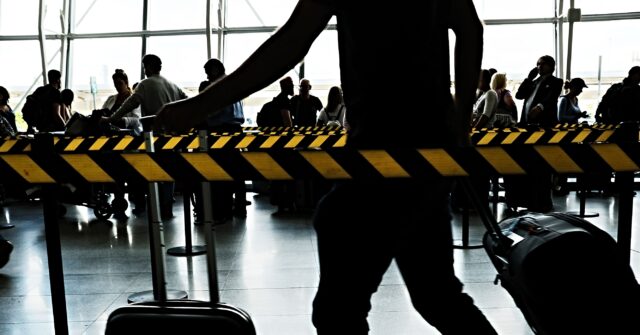Many Korean companies sneak their employees into U.S. jobs via visa programs that do not allow travellers to work, Korean business leaders admitted to the AFP news service.
The labor smuggling “was a normal practice” and is “deeply rooted in business operations, a source from Korea’s battery industry told the news service. “But this may have to change from now on,” the source said.
The admission comes after President Donald Trump’s deputies detained roughly 300 Korean workers at a taxpayer-backed Hyundai factory construction site in Georgia. The workers got through the U.S. borders by using B-1/B-2 visa for tourists and business travelers, or by getting approval via the Electronic System for Travel Authorization (ESTA) process.
Those visa routes, however, sharply limit the type of work that can be performed by the travellers. For example, the approvals do not allow travelers to perform routine construction work.
RELATED: Americans Are Being Replaced By Foreign Workers
But President Joe Biden’s deputies routinely opened the border to foreign workers, and immigration lawyers claim the visas provide some leeway for visitors to install imported machines and production lines.
AFP reported:
Last week’s raid has left business leaders with “a sense of betrayal and anxiety,” a senior executive from the semiconductors industry told AFP. “Most of the companies follow similar practices so this could happen to any of them,” he said on condition of anonymity.
Government officials have long recognized the problem, the AFP reported:
South Korea is pushing for the “Partner with Korea Act” in Washington, which would create a quota of 15,000 visas for skilled [Korean] professionals. “Unfortunately, the number of sponsoring lawmakers has decreased compared with when the bill was first introduced a decade ago,” Kim said, adding it reflected growing anti-immigration sentiment.
However, the long-established L-1 visa was created to allow companies to deploy specialists to the United States for narrow tasks such as managing the construction of specialized factories.
The Department of Homeland Security releases very little information about the use and misuse of B-1/B-2 visas and the ESTA process by U.S. and foreign companies. There is some evidence that the visas are used in large numbers to fill many white-collar technology jobs and trucker jobs within the expanding Indian and Sikh enclaves in the United States.
The Korean admissions come amid a nationalist-themed political and media uproar in Korea over Trump’s arrest, chaining, and deportation of the Korean workers.
Korean employers work their employees much harder than American companies. In 2024, for example, Korean business officials asked their government for approval to require employees to work 69-hour weeks.
Hyundai is also facing multiple lawsuits and investigations over the use of foreign workers in American worksites. Last week, Yahoo News reported that the company is facing charges that it abused the TN Visa program for Mexican and Canadian college graduates:
The lawsuit, filed by two Mexican professionals, alleges the companies used a bait-and-switch scheme to lure them to the U.S. with promises of engineering roles but instead placed them into lower-paying manual labor jobs, denied them overtime pay, and subjected them to discrimination. One plaintiff also claims she was terminated after disclosing her pregnancy.
…
According to court documents, Martinez discovered that GFA paid him and his Mexican engineer colleagues approximately $11 per hour—significantly less than the $17–18 per hour earned by U.S.-born coworkers performing similar tasks.
In 2022, Reuters reported:
At least four major suppliers of Hyundai Motor Co and sister Kia Corp have employed child labor at Alabama factories in recent years, a Reuters investigation found, and state and federal agencies are probing whether kids have worked at as many as a half dozen additional manufacturers throughout the automakers’ supply chain in the southern U.S. state.
Many Democrats have backed the Korean companies’ use of migrant labor, but the AFL-CIO union denounced the secretive policy on September 7, saying:
For years, Hyundai—including its joint ventures and the suppliers that work in its plants—cut corners on industry-standard safety precautions, refused to respect workers’ right to a union, and relied on the exploitation of immigrant labor to build its factories and supply chains. We’ve recently seen the consequences of this behavior: three workers at Hyundai were killed at work in the last two years.
When workers are put in danger by predatory companies like Hyundai, there is an opportunity for a constructive response from the federal government: OSHA and the NLRB have tools at their disposal to increase workplace safety.
Three workers have been killed at the Korean-run factory complex.
However, the AFL-CIO undercut its own position by promising to support the employment of illegal migrants:
nfortunately, the militarized federal crackdown on these workers further hurts safety at Hyundai. Workers are not the problem. Exploitative corporations are. The UAW will always stand with all workers—immigrant and native-born alike—against unsafe corporations and militarized attacks on our workplaces.
Meanwhile, Democrats and progressives are trying to eliminate the legal and civic distinctions between American citizens and illegal migrants.
On September 8, more than 20 Democrats from the party’s Asian caucus and the Georgia delegation issued a statement protesting the deportations:,
We are deeply alarmed by the recent immigration raid at a battery plant in Georgia. Hundreds of immigrants—many of whom are of Korean descent—have been detained, reportedly including U.S. citizens and lawful permanent residents. Instead of targeting violent criminals, the Trump administration is going after immigrants at work and in communities of color to meet its mass deportation quotas. These senseless actions rip apart families, hurt the economy, and undermine the trust of our global partners. We are closely monitoring the situation and demanding the administration uphold due process for the workers impacted.
“Yes, it’s one of those things that has always been technically illegal but virtually never enforced; at least until this admin,” sniffed Aaron Reichlin-Melnick, an advocate at the American Immigration Council. The Koreans were likely “doing some management of the construction … [but] definitely not taking an American job,” said the immigration lawyer.

















